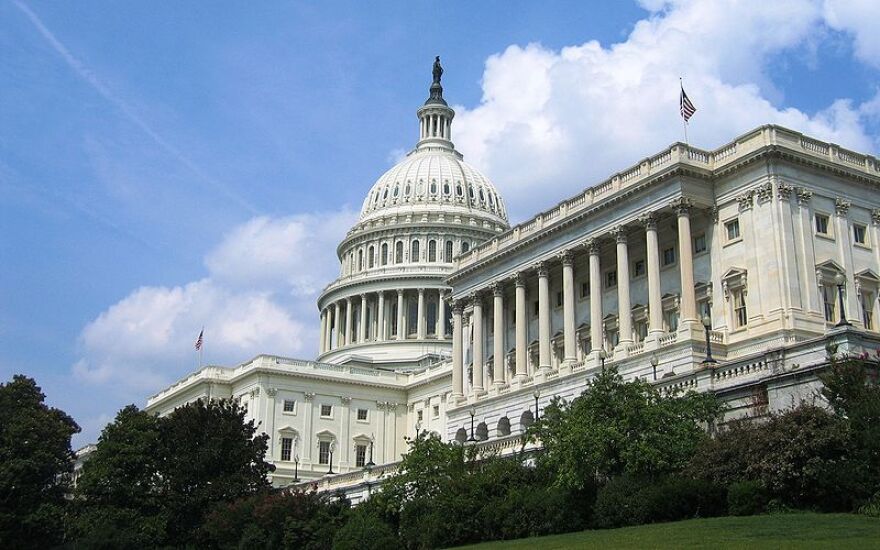On Wednesday, October 9th, we asked a simple question of the 16 members of Michigan's congressional delegation, "Is meeting the Oct 17th debt ceiling deadline important to you? Why or why not?" You can see their responses below. We're updating this post as the responses come in.
In a news conference on Oct. 8, President Obama warned that "if Congress refuses to raise what's called the 'debt ceiling,' America would not be able to meet all of our financial obligations for the first time in 225 years."
The result, he says, would be financial turmoil.
Here's how Bloomberg News puts it:
The U.S. will have about $30 billion in cash after its borrowing authority is exhausted on Oct. 17. The country would be unable to pay all of its bills, including benefits, salaries and interest, sometime between Oct. 22 and Oct. 31, according to the Congressional Budget Office.
But lately we're hearing news that some legislators in Washington D.C. don't think the October 17th debt ceiling deadline is all that important.
Sen. Rand Paul of Kentucky said, "If you don’t raise your debt ceiling, all you’re saying is, ‘We’re going to be balancing our budget.’"
That's a nice talking point, but the debt ceiling is not where budgets are made. Former U.S. Treasury spokesman, Tony Fratto, put it like this:
Most Americans think we shouldn't raise the debt ceiling because they think it provides some limit on spending. And it really doesn't. It has nothing to do with spending in the future. It merely allows the government to raise the money to pay for the programs that have already been authorized.
So where do Michigan's legislators stand on the fast-approaching deadline?
We asked our 16 representatives in Washington D.C. what they think about the debt ceiling deadline. We posed the question through open social media channels. The Twitter hashtag #talk2Michigan was used to monitor the discussion.
See below for what they said so far. We're posting the responses in the order we received them.
As we get more responses, we'll update this post.
The first response came from Rep. Dan Kildee of Flint.
@MichiganRadio U.S. must meet our commitments. Default would jeopardize the full faith & credit of U.S. We must pay our bills #Talk2Michigan
— Rep. Dan Kildee (@RepDanKildee) October 9, 2013
.@MichiganRadio Absolutely. Working families pay their bills, & so too should nation. Default threatens faith & credit of US. #talk2Michigan
— John Dingell (@JohnDingell) October 9, 2013
.@michiganradio borrowing costs would spike, Social Security checks would be delayed, retirement accounts would lose significant value
— Rep. Sandy Levin (@repsandylevin) October 9, 2013
.@MichiganRadio Absolutely. We need to keep stability and confidence in our economy, and protect the investments of our retirees.
— Mike Rogers (@RepMikeRogers) October 9, 2013
@MichiganRadio Yes! In 2011, even threatening a default added $100/month to new mortgages; cost $800B in retirement savings. #talk2Michigan
— Debbie Stabenow (@stabenow) October 9, 2013
@MichiganRadio Yes it is and I am committed to working with my colleagues & w/ the President to make sure America does not default.
— Rep. Bill Huizenga (@RepHuizenga) October 10, 2013
.@MichiganRadio yes but we can't rubber stamp. Taking on more debt to pay for past debt is mortgaging our kids future to avoid tough choices
— Rep Kerry Bentivolio (@RepKerryB) October 10, 2013
@MichiganRadio Yes. As a doctor for 30 years, I’m used to fixing things. Like the OR, Washington needs to work together to find solutions.
— Dr. Dan Benishek (@CongressmanDan) October 11, 2013
@MichiganRadio Vital. Failure to do so would damage full faith & credit of US, threaten global recession.
— Senator Carl Levin (@SenCarlLevin) October 11, 2013
*Clarification - an earlier post stated "Rep. Huizenga's office deleted our initial request," and that "it appears that Rep. Bentivolio's office deleted our question twice." Both offices say they do not delete Facebook posts from others.




